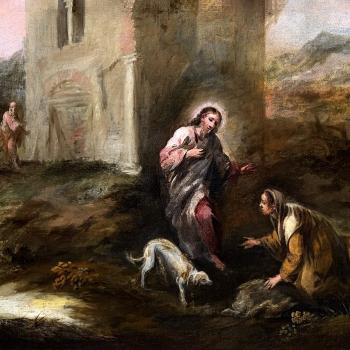
Greed underlies many problems in the world today. Our system of government and economic engagement often rewards greed, allowing those who are wealthy seek to gain more and more wealth, wealth without limit, without consideration of those whom they hurt. And where do they get their wealth from? Do they create it? While, they often try to claim that, they do so by relying upon the work of others, workers who they do not pay justly for what they have done. Or they take what is already there and find a way to make it their own, leading to those who are impoverished not get what they need.
Despite how much money they have, the wealthy tend to want more. “He who loves money will not be satisfied with money; nor he who loves wealth, with gain: this also is vanity” (Eccl. 5:10 RSV). Any attempt to change the system, to help those in need, is consistently attacked as if it were the greatest evil imaginable; this is why those who encourage a more equitable system are constantly attacked as “socialists” or “communists” even though most who do so are far from being either. They might spend a little money to spread propaganda saying this, knowing that, because people accept it, they will ultimately reap more money than they have sowed. What is worse is that those who should know better, Christians who read Scripture, defend the system, and the rich who manipulate it. If they paid attention, they would know that the love of money is called a root of all kinds of evil, even as they would find that Jesus criticized the rich while he promoted and blessed the poor. Indeed, Christ made it clear, life should not be lived for the sake of accumulating material wealth: “Take heed, and beware of all covetousness; for a man’s life does not consist in the abundance of his possessions” (Lk. 12:15b RSV).
Whatever material goods one acquires throughout their life might give them some pleasure, but that pleasure is transitory, as all material wealth is transitory. If not in life, then in death, everyone will lose all the material goods they have accumulated for themselves throughout their life. When we die, when we come to the eschatological judgement (and what lies beyond it), we will be shown that our true wealth is found in the character we have developed for ourselves, in the virtues which we have acquired. The more good we do, the more truth we seek, the more we will obtain treasures which will last, treasures which will be ours for eternity:
Do not lay up for yourselves treasures on earth, where moth and rust consume and where thieves break in and steal, but lay up for yourselves treasures in heaven, where neither moth nor rust consumes and where thieves do not break in and steal. For where your treasure is, there will your heart be also (Matt. 6:19-21 RSV).
Greed promises us much which it cannot and will not fulfill. It tells us that the way to gain happiness is through material goods. The more we listen to it, the more we believe we can and should be able to do anything we want to obtain our goal, even if it means we will hurt others in the process. Greed says that those who are wealthy prove their worth to society, and because of that worth, their actions cannot be questioned.
To resist the temptations which greed give us, we do not have to do the exact opposite it suggests, that is, we do not have to give up all material wealth, though some can do so in a voluntary way in order to engage a heroic struggle against it. What we need is to moderate our engagement with money and wealth, making sure that everyone is able to make enough to survive and thrive. Different people can have different levels of wealth, but how they use it is also important. The wealthy can remain wealthy, but if they are, they should see themselves as stewards of the wealth, using it to help not just themselves, but everyone, with the resources they have:
As for the rich in this world, charge them not to be haughty, nor to set their hopes on uncertain riches but on God who richly furnishes us with everything to enjoy. They are to do good, to be rich in good deeds, liberal and generous, thus laying up for themselves a good foundation for the future, so that they may take hold of the life which is life indeed (1 Tim. 6:17-19 RSV).
The desert fathers and mothers lived their lives detaching themselves from monetary gain, constantly telling each other, and through their conversations, everyone else who listens to them, of the need Christians have to reject avarice and all that avarice suggests. Indeed, they often remind each other why: “It is impossible for you to live a godly life if you love pleasure and money.”[1] Even when we justify acquiring possessions, because of the good we might find in them, they warned us to remember who was hurt in the process of their creation and the process of us acquiring them:
A brother asked Abba Serapion, “Utter a saying for me.” The elder said, “What am I going to say to you? That you took the goods of widows and orphans and set them in this casement?” – for he saw that it was full of books.[2]
The desert fathers and mothers were expected to live a life of voluntary poverty, taking on a radical approach to possessions, embracing a way of life which can be said to be beyond what God normally expects for us. Thus, when we read stories about them, we will see examples of how they lived out their voluntary poverty, sometimes showing them to denounce what would be acceptable for others, as can be seen in the way Serapion chastised a monk for possessing many books (which, in his day and age, would have been seen as representing a great fortune, as books were made by hand, making them much more costly to produce than they would be after the invention of the printing press). However, we should consider what Serapion was telling the monk, that is, we must consider the ramifications of what we buy, and who is adversely affected by our actions, even if it seems to be something as harmless as collecting books. We must make sure we try to do some good to compensate for our own engagement of the system itself. Thus, if we buy many books, let us make sure we put what we learn from them to good use, and not just for ourselves, but for others. What is important, and what the desert fathers and monks knew, is that we should put truth into action, which greed, one way or another, would have us forget as we instead find ourselves encouraged to ignore injustice and stay satisfied with the good which we experience for ourselves.
[1] The Book of Elders. Sayings of the Desert Fathers. The Systematic Collection. trans. John Wortley (Collegeville, MN: Cistercian Publications, 2012), 92 (Isidore 3).
[2] The Book of Elders. Sayings of the Desert Fathers. The Systematic Collection, 93 (Serapion 2).
Stay in touch! Like A Little Bit of Nothing on Facebook.
If you liked what you read, please consider sharing it with your friends and family!
N.B.: While I read comments to moderate them, I rarely respond to them. If I don’t respond to your comment directly, don’t assume I am unthankful for it. I appreciate it. But I want readers to feel free to ask questions, and hopefully, dialogue with each other. I have shared what I wanted to say, though some responses will get a brief reply by me, or, if I find it interesting and something I can engage fully, as the foundation for another post. I have had many posts inspired or improved upon thanks to my readers.













